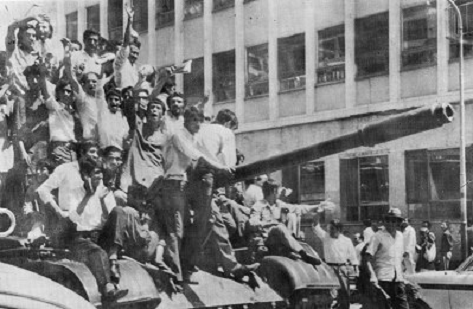Nothing
"Sticky" About Religious Accommodation
(letter
to the People's Voice editor printed May 16-31, 2012 issue)
In
your May Day 2012 issue letters section, Wayne Madden writes that a
flawed on-line CBC poll aligned him with the Wildrose Party on one
question because he believes “giving extra protection to certain
religious groups, whether that group is a minority or a majority in
society” amounts to the state establishment of religion and somehow
puts religious rights over other rights.
The
actual question on-line is not about protection but accommodation:
“How much should be done to accommodate religious minorities in
Alberta?” It’s revealing that the question was misinterpreted
this way. There is a reason why we need extra efforts to accommodate
faith-based minorities but don’t need more efforts to accommodate
faith-based majorities, similar to why we need efforts to accommodate
LGBT2SQI and not heterosexuals, why we need extra efforts to
accommodate women but not men, and why we need extra efforts to
accommodate oppressed peoples but not their oppressors. This is
because of the existence of patriarchy and racism, which are
historical oppressions tied to systems of production that pre-date
capitalism but have become interconnected with capitalism.
Attacks
on faith-based minorities are often really racism-driven attacks.
After all no one administered theology tests trying to distinguish a
Sikh from a Muslim during the vigilante attacks which followed in the
wake of 9/11, such as firebombing mosques and Gurdwaras (Sikh
temples), assaulting men with turbans or women wearing veils.
Religion may or may not have been an important part of the victims’
lives, but that was no protection from the racists. The reason
faith-based minorities are attacked are because of fears of losing
WASP (White Anglo-Saxon Protestant) supremacy, and if we don’t
protect the minorities we leave the working class and its allies open
to divide-and-conquer.
This
is similar to why we need laws protecting the rights of workers and
the poor but don’t really need laws protecting the rights of the
bosses. We can say that a law forbidding anyone from sleeping under a
bridge is equal, but the truth is that under capitalism the rich have
plenty of homes whereas the working poor and unemployed need the
bridge for shelter. Similarly, faith-based minorities don’t have
access to most of the capital in this country (contrary to
anti-Semitic conspiracy theories) and need to be protected from those
who do.
There
is much institutionalization of some religions over others many of us
take for granted, such as why our weekends are on Sundays and
Saturdays, why statutory holidays coincide with Judeo-Christian ones,
as well as bias in school textbooks.
Religion
is not something that exists independent of the historical processes
behind patriarchy, race, and class. It’s no accident that people in
some parts of Europe are Catholic whereas others are Protestant,
while others still are Muslim, Jewish, pagan, etc. Religion is
interconnected with ethnicity, culture, and race, and so religious
rights don’t exist in isolation from other rights.
Unfortunately
there is a big blind spot not just in Canada generally but within the
left in particular which ignores the realities of patriarchy and
racism when opining on issues that only from the surface seem
unrelated, such as religious accommodation. In particular
Islamophobia operates by painting Muslims as a threat to secularism,
whereas Muslims don’t have the power to threaten secularism here
but the capitalists behind WASP supremacy do. Bogus campaigns in
Ontario and in the United States against non-existent Shari’a
courts gain acceptance from the left by re-branding racism as
secularism, when in fact there has never been a proposal to establish
Shari’a courts in North America.
My
recommendation to People’s Voice readers is that if you ever find
yourself on the same side of an issue as the Wildrose Party or other
bigots, even if it is on an on-line poll however flawed, you should
reconsider your views, repeatedly if necessary! The issue of
accommodating minorities, even faith-based ones, is not “sticky”
or complicated after all, any more than racism and patriarchy are.
S.
Saleh Waziruddin,
Niagara
Falls, ON
